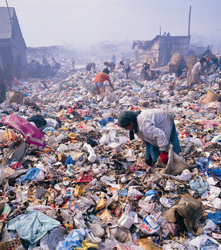Improving solid waste management in Asia
Developing Asian countries need a new waste management system that is cost effective, sustainable and technologically efficient. An EU-funded project, 'Integrated sustainable solid waste management in Asia' (Issowama), has provided the kick-start needed to develop such a system by engaging stakeholders. These include Asian and European research organisations, universities, local waste processors and local municipalities. The project served to identify environmental issues, gaps in technical knowledge, and socioeconomic and policy barriers. A major finding was that the public remains largely unaware of the problems associated with poor waste management. Hurdles in this regard include lack of access to educational measures and lack of funds to develop comprehensive strategies. The Issowama network proposed directions for future research and local implementation to achieve sustainable solid waste management in Asian countries. These strategies will have to be tailored to the needs of individual countries to ensure the participation of all stakeholders. Members of the Issowama network have agreed that integrating technologies and promoting research collaborations is the right approach to solving issues such as environmental damage, disease and water pollution that are the result of inadequate waste management.







